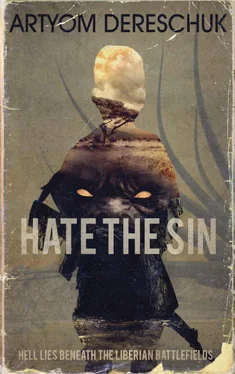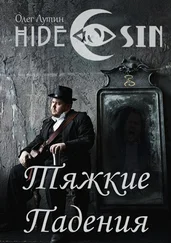He took a deep breath, and replied: “Yes.”
The person lifted his hand and pointed toward the lamp: “Go ahead. Turn on the light. I’d like to talk face-to-face. No use hiding in the shadows.”
Intrigued, the priest headed for the lamp and turned it on. The stranger turned out to be a black man in his thirties. A nice business suit—not like anything the General or anyone in his neighborhood could afford. Confident posture. At first the priest didn’t recognize him, but when their eyes met the realization struck him—there was only one person whom he had seen wear that somber and indifferent look.
Tsetse.
Back in the day, the General liked the look in the boy’s eyes. He found it fascinating how the kid wouldn’t flinch no matter what. It was why he had made him captain in the first place. Not only because he knew that no one would dare to cross someone with eyes like those, but because he was partly curious: how far could he push the boy before the kid would break? How heinous and outlandish would his orders have to get before the boy would start showing something other than indifference? Was there something alive inside of him, or was he just a machine by then, completely desensitized to everything around him?
And now those were looking at him again. It was as if the General had found an old photo album—those eyes were staring at him from a point in time that came and went twenty years ago.
A point when the boy was trying to shoot him.
“Tsetse,” the General weakly said. “Is that you?”
The man silently nodded, his eyes locked with the General’s.
“Did you come here to kill me?” the General bluntly asked. There was no fear or regret in his voice. Somehow, he felt some fatherly pride in the man before him. After twenty years, he had finally decided to finish what he’d started.
But Tsetse shook his head: “No. I didn’t come here out of vengeance. To do so would prove your stupid ramblings correct. I am here to talk.”
“To talk?” The General’s eyebrows went up in surprise.
“Yes,” he said. “I attended your service last week. I wanted to see what kind of man you are. You were preaching about forgiveness and change in people. That we change for the best. And as I was listening, I couldn’t help but wonder… were you talking from experience?”
“Ah, I see.” The General gently smiled. “So you wanted to check on your old mentor?”
Tsetse didn’t react to the question. After a few seconds, the General continued: “Yes, people can change. I’ve done many horrible things in the past, but since then, I’ve let God into my life. I’ve realized that I was seduced by the Devil all along. And—”
“What about the children?” Tsetse interrupted him.
“The children?” the General wondered. He didn’t understand the question.
“Do you regret what you did to the children?” Tsetse pressed on, and the man nodded: “Yes, certainly. Many of the kids were left fatherless because of my beliefs, and—”
“I meant your children.”
The General stopped and, for the first time since the beginning of this conversation, he frowned: “I don’t understand what you mean, Tsetse. What have I done to children?”
“Do you regret what you did to the children under your command, General?” Tsetse leaned forward. His eyes remained calm, but his body was betraying the fact that he was restless to hear the answer.
“I don’t like your tone, Tsetse.” The General pursed his lips. “I’ve said that I’ve done many horrible things and I regret them. Do you need the specifics?”
“Yes,” Tsetse immediately answered. “I want the specifics. Do you regret what you did to them or not? I bet you’ve never admitted it to anyone, have you? You probably said that you were a soldier during the First Civil War. Did you tell anyone that you were guiding children into battle?”
“Times were different, Tsetse.” The man snarled. “If it wasn’t for me, they’d be dead.”
“Most of them ARE dead,” Tsetse interrupted, his voice ringing with the steel of his resolve to get the words he needed out of the man. “And those who live now wish they were, too.”
“Well they could’ve left the brigade then!” the General exclaimed. “Walked out into the wilderness. I never held them hostage, they were begging me to let them stay!”
“Children are always hostages of their environment,” Tsetse objected. “Besides, they knew you’d put a bullet in the back of their heads if they ever tried to leave.”
“Bullshit, I—“
“Enough with the lame excuses, General,” Tsetse interrupted him in a tone that showed that he wouldn’t tolerate it all anymore. “Do you admit that you were wrong, General? Yes or no?”
The man went silent and didn’t speak up for a long time, but Tsetse could see that he had hit a nerve—judging by his face, there was a storm brewing inside him.
Finally, he spoke up, and his tone was laced with poison and ire.
“No. I made them tough. I made them warriors, Tsetse. A warrior does not stop being a warrior when he leaves the battlefield. When the war’s over he doesn’t get soft—he is always ready for the next one. They are only alive now because I prepared them for the adult life.”
“You didn’t make them tough,” Tsetse objected. “You left them no choice but to be tough. They have blood on their hands only because of you.”
“Better to go out like a warrior than to lead a meek life, waiting for a bullet to end you!” the General burst out.
“Do you want to see what kind of warriors you were crafting?” Tsetse suddenly asked him. “Do you?”
The General didn’t answer, and Tsetse stood up. For a moment, the General thought that Tsetse was going to show him by killing him, but the man just walked past him.
Carefully, not taking his eyes off of the General, Tsetse walked over to the door, opened it, and waved for someone to come in. The man who walked in was in his early thirties, but the General could only recognize that fact due to the fact that he had seen many people over the years, and he knew what a heavy toll living in their country was putting on them. If not for his experience, he’d think the newcomer was in his fifties. His back was arched, his arms and legs thinned out so much that the skin seemed to be hanging on bones and tendons alone, and judging by the way his clothes hung loosely on his chest, the stranger was all ribs underneath. His eyes were sunken and had bags under them, and when the stranger walked in he threw only a short glance at the General, before directing his stare back at the floor.
“Here, here.” Tsetse patted the man on the shoulder. “It’s all right.”
The captain turned around and faced the General. There was something new in his eyes. Some fire of emotion.
“Look at this man.” Tsetse pointed toward the newcomer. “Do you recognize him?”
The former General squinted at the man, but couldn’t see anything familiar or even unusual about him.
“What, am I supposed to recognize this alcoholic you’ve brought into my house?” he grunted. “Looks the same as all the other losers to me.”
“This is Puppy Slayer,” Tsetse explained. “Does that name mean anything to you?”
“Puppy Slayer…” The General slowly repeated the name, rolling it on his tongue as if tasting it. “Hold on, is he from the brigade? Is it that boy that was good for nothing?” The General laughed. “Yeah, it’s coming back now. He was with us during the last days of the brigade. I never imagined that he was the one to survive.”
“He almost didn’t,” Tsetse noted. “Corpse Eater found him when he was already on his last breath and led him to the surface.”
“Corpse Eater?” A new intonation entered the General’s voice; he was worried. “Is he…?”
Читать дальше












